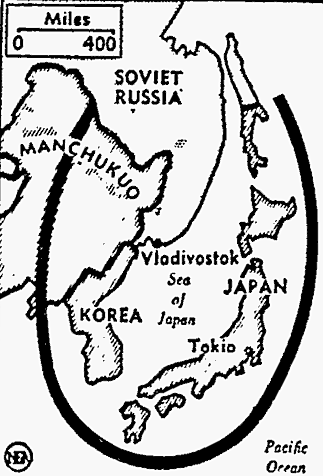Japanese Foreign Office (July 24, 1941)
[Secret]
From: Tokyo
To: Washington
July 24, 1941
Purple (CA)
#406
Secret outside the Department.
Re my #397.
That the leaders of the United States Government will at this time display a high degree of statesmanship is what I am secretly hoping for the sake of maintaining peace in the Pacific. The Japanese Government would do likewise and would like to reciprocate. However according to information received by us lately, especially according to newspaper reports, there is the possibility of the United State freezing Japanese funds or of instituting a general embargo on petroleum, thus strongly stimulating public opinion in Japan. Should this plan of freezing Japanese funds be put into effect, it would have an adverse effect on many aspects of our domestic life and might compel us to resort to diverse retaliatory measures. This would lead to a breakdown of Japanese-American economic relations an we cannot be certain that it would not in turn hasten the development of the worst situation. Will you please get in touch with Finance Official NISHIYAMA and, in accordance with the contents of the caption telegram, request the United States Government favorably treat this question.
Army 20034 Trans. 7/25/41 (5)
U.S. Department of State (July 24, 1941)
740.0011 Pacific War/482Press release issued by the Department of State
July 24, 1941In response to inquiries by press correspondents, the Acting Secretary made the following statement:
It will be recalled that in 1940 the Japanese Government gave expression on several occasions to its desire that conditions of disturbance should not spread to the region of the Pacific, with special references to the Netherlands East Indies and French Indochina. This desire was expressly concurred in by many other Governments, including the Government of the United States. In statements by this Government, it was made clear that any alteration in the existing status of such areas by other than peaceful processes could not but be prejudicial to the security and peace of the entire Pacific area and that this conclusion was based on a doctrine which has universal application.
On September 23, 1940, referring to the events then rapidly happening in the Indochina situation, the Secretary of State stated that it seemed obvious that the existing situation was being upset and that the changes were being achieved under duress. Present developments relating to Indochina provide clear indication that further changes are now being effected under duress.
The present unfortunate situation in which the French Government of Vichy and the French Government of Indochina find themselves is, of course, well known. It is only too clear that they are in no position to resist the pressure exercised upon them.
There is no doubt as to the attitude of the Government and people of the United States toward acts of aggression carried out by use or threat of armed force. That attitude has been made abundantly clear.
By the course which it has followed and is following in regard to Indochina, the Japanese Government is giving clear indication, that it is determined to pursue an objective of expansion by force or threat of force.
There is not apparent to the Government of the United States any valid ground upon which the Japanese Government would be warranted in occupying Indochina or establishing bases in that area as measures of self-defense.
There is not the slightest ground for belief on the part of even the most credulous that the Governments of the United States, of Great Britain, or of the Netherlands have any territorial ambitions in Indochina or have been planning any moves which could have been regarded as threats to Japan. This Government can, therefore, only conclude that the action of Japan is undertaken because of the estimated value to Japan of bases in that region primarily for purposes of further and more obvious movements of conquest in adjacent areas.
In the light of previous developments, steps such as are now being taken by the Government of Japan endanger the peaceful use by peaceful nations of the Pacific. They tend to jeopardize the procurement by the United States of essential materials such as tin and rubber which are necessary for the normal economy of this country and the consummation of our defense program. The purchase of tin, rubber, oil or other raw materials in the Pacific area on equal terms with other nations requiring these materials has never been denied to Japan. The steps which the Japanese Government has taken also endanger the safety of other areas of the Pacific, including the Philippine Islands.
The Government and people of this country fully realize that such developments bear directly upon the vital problem of our national security.
The Pittsburgh Press (July 24, 1941)
JAPANESE TAKE OVER IN INDOCHINA
By Robert P. Martin, United Press staff writer
Shanghai, July 24 –
Japan is preparing to land troops this weekend on the southeast coast of French Indochina within striking distance of the Philippines, Singapore and the rich Netherlands East Indies, foreign intelligence advices indicated today.
These advices were borne out by guarded private dispatches from Tokyo which indicated that Japan, now under a rigid censorship, would announce the occupation of Indochina as an accomplished fact at least by Monday.
In Vichy, an official French spokesman said France has agreed to Japanese demands for virtually complete military control of French Indochina to “save it from the British,” allowing the Japanese to occupy bases “temporarily.”
French authorities in Indochina likewise imposed a blanket censorship. Manila reported that no replies had been received for the last 24 hours to queries sent there.
A Japanese embassy spokesman announced that foreigners here would no longer be given accomodations on liners bound for Japan. He said that reasons of the ban were not known.
Intelligence reports received here indicated that Japan, as its first move, intended to land small forces, sent down the China Sea, from Canton, at Saigon, the big Indochina base on the southeast coast.
Saigon is about 700 miles from the nearest of the Philippines group and about the same distance from Singapore and the Netherlands East Indies.
A United Press Batavia dispatch said a three-day air raid blackout drill had been ordered for that capital of the Netherlands Indies, starting Saturday. At the same time, there will be technical staff maneuvers near Batavia:
…to test liaison in respect to the means by which a land invasion would be repelled in this area.
It was believed certain that Japanese naval forces would take possession of the great Cam Ranh naval base, up the coast from Saigon. Cam Ranh is in one of the best natural harbors in the world.
Probably peaceably
The occupation probably will be peaceable because the Vichy government, for one thing, has consented, and for another, has not the forces, even it had the disposition, to oppose.
Belief was that Japan would now be content for the present and would consolidate its new position and await the outcome of the grand-scale battles between Russia and Germany. Then, it was said, Japan would make its decision regarding an attack on Russia’s Far Eastern army.
Diplomatic reports indicated that Japan’s basic policy remained as it had been – expansion to the south and settlement of the war in China. As regards Siberia, it was held that Japan was anxious over the possibility of German domination there, the implication being that, while Japan had taken Germany for a diplomatic friend, it might not like Nazis as neighbors.
Expects no U.S. opposition
Indications were that Japan expected no actual opposition from Britain to its occupation of Indochina and that it intended to follow up its gains by putting pressure on Thailand, which is British Burma’s neighbor. In dealing with Thailand, it was said, Japan would seek badly-needed economic concessions and air force bases from which to attack the Burma Road, China’s lifeline of supply.
Japanese sources circulated reports that General Sir Archibald Wavell, new British commander-in-chief in India, had arrived in Chungking, the temporary Chinese capital, and had conferred with Sir Archibald Clark Kerr, the British ambassador, and General Chiang Kai-shek, China’s leader.
According to these sources, General Wavell intended to continue on to Moscow.
London said the report of Wavell’s arrival at Chungking was untrue.

